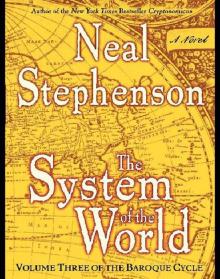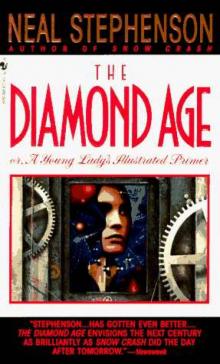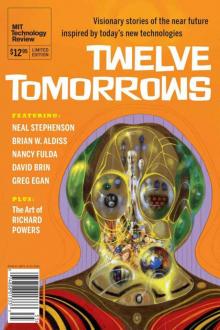- Home
- Neal Stephenson
Some Remarks: Essays and Other Writing Page 11
Some Remarks: Essays and Other Writing Read online
Page 11
Thirty-one floors below is the Shen Zhen (Deep River) itself, which separates China-proper’s Special Economic Zone from Hong Kong and eventually flows into the vast estuary of the Pearl River. The boundary serves the combined functions of the Iron Curtain and the Rio Grande, yet in cyberspace terms it has already ceased to exist:
—The border is riddled with leased lines connecting clean, comfortable offices in Hong Kong with factories in Shenzhen, staffed with nimble and submissive girls from rural China. Shenzhen’s population is 60 percent female.
—The value of many Hong Kong stocks is pegged to arcane details of PRC government policy, which are announced from time to time by ministries in Beijing. For a long time, the Hong Kong market has fluctuated in response to such announcements; more recently, the fluctuations have begun to happen hours or days before the policies are made public.
—Hong Kong television is no longer targeted at a Hong Kong audience; it is now geared for the 20 million people in the Pearl Delta—the 80-mile-long region defined by Guangzhou (Canton) in the interior, Hong Kong and the Shenzhen SEZ on the eastern bank, and Macao and the Zhuhai SEZ on the western bank. Thickets of television antennas, aimed toward Hong Kong, fringe the roof of every Pearl Delta apartment block. Since TV Guide and its ilk are not available, Star TV regularly flashes up a telephone number bearing the Hong Kong prefix. Dial this number and they will fax you a program guide. This is easy for Shenzhen residents, because . . .
—Every telephone in Shenzhen has international direct dial.
THE FIRST THING THAT HAPPENED DURING JARUZELSKI’S MILITARY COUP IN Poland was that the narcs invaded the telephone exchanges and severed the trunk lines with axes, ensuring that they would take months to repair. This and similar stories have gotten us into the habit of thinking that modern information technology is to totalitarianism what crosses are to vampires. Skeptics might say it’s just a coincidence that glasnost and perestroika came just after the photocopier, the fax, and the personal computer invaded Russia, but I think there’s a connection, and if you read WIRED, you probably do too. After all, how could any country whose power structure was based on controlling the flow of information survive in an era of direct-dial phones and ubiquitous fax machines?
Now (or so the argument goes), any nation that wants a modern economy has to have information technology—so economic modernization will inevitably lead to political reform, right?
I went to China expecting to see that process in action. I looked everywhere for hardy electronic frontierfolk, using their modems and fax machines to push the Communists back into their holes, and I asked dang near everyone I met about how communications technology was changing Chinese culture.
None of them knew what the hell I was talking about.
I was carrying an issue of WIRED so that I wouldn’t have to explain it to everyone. It happened to be the issue with Bill Gibson on the cover. In one corner were three characters in Hanzi (the script of the Han Chinese). Before I’d left the States, I’d heard that they formed the Chinese word for “network.”
Whenever I showed the magazine to a Chinese person they were baffled. “It means network, doesn’t it?” I said, thinking all the warm and fuzzy thoughts that we think about networks.
“Yes,” they said, “this is the term used by the Red Guards during the Cultural Revolution for the network of spies and informers that they spread across every village and neighborhood to snare enemies of the regime.”
GOING TO CHINA AND ASKING PEOPLE ABOUT THE HACKER ETHIC IS LIKE going to Peoria and talking to the folks down at Ned’s Feed & Grain about Taoism. The hacking part comes to them easily enough—China is, in a sense, a nation of analog hackers quickly entering the digital realm. But I didn’t see any urge to draw profound, cosmic conclusions from the act of messing around with technology.
SHENZHEN HAS THE LOOK OF AN INFORMATION-AGE CITY, WHERE LOCATION IS basically irrelevant. Unlike, say, Shanghai (which is laid out the old-fashioned way, on an armature of heavy industry and transportation lines), Shenzhen seems to have grown up without any clear central plan, the office blocks and residential neighborhoods springing into being like crystals from a supersaturated solution. Think of the difference between Los Angeles and New York City, and you might get a general idea of what I mean. Streets tend to be straight, wide, and many-laned, with endless iron fences running down the middle so that pedestrians and bicyclists are forced, against all cultural norms, to cross only at major intersections. Shenzhen has more cars and fewer bicycles than most Chinese cities. This has shifted the balance of power somewhat; in, say, Shanghai, mobs of bicyclists play chicken with the cars and frequently win. But in Shenzhen they stand defeated on the curbs, waiting for the light to change. Occasionally some young scoundrel will dart out and try to claim a lane and be driven back by taxi drivers, scolding him with horns and shaking fingers.
Even on a humid day (which is to say, every day) the place is rather dusty, like a construction site where things haven’t been tamped down yet. Houses are rare, though there is one district that looks something like an American suburban housing development, albeit more tightly packed. But this one looks like it’s been abandoned and then recolonized by survivalists: Every house is surrounded by a high wall topped with something sharp, and if you peer between the iron bars of the gates, you can see that the windows and patio doors of the houses are additionally protected by iron bars and expanding metal security gates. Beyond that, everyone lives in high-rises.
On every block in central Shenzhen, clean new high-rises protrude from organic husks of bamboo scaffolding. Nissan flatbed trucks rumble away from the waterfront stacked with sheets of Indonesian mahogany plywood on its way to construction sites, where it will be used in concrete forms and then thrown away. The darkness is troubled by the report of nocturnal jackhammers, and all-night arc-welders hollow immense spheres of blue light out of the translucent, steamy atmosphere.
Only a quarter mile away from this scene of hysterical development, a green hillside rises, covered with an undisturbed mat of tropical vegetation and empty except for an ancient cemetery. It doesn’t make sense until you realize that you’re looking across the Shen Zhen into Hong Kong territory. Running parallel to the river is a border defense system meant to keep the mainland Chinese out. A chain of sodium-vapor lamps and a high fence topped with razor ribbon cuts across lakes and wetlands that have become wildlife refuges by default.
CORRUPTION IN CHINA IS NO SECRET, BUT THE WAY IT’S COVERED IN WESTERN media suggests that it’s just an epiphenomenon attached to the government. In fact, corruption is the government. It’s like jungle vines that have twined around a tree and strangled it—now the tree has rotted out and only the vines remain. Much of this stems from the way China is modernizing its economy.
If you thought zaibatsus were creepy, if Singapore’s brand of state-backed capitalism gives you the willies, wait until you see the Sino-foreign joint venture. The Russians, in their efforts to turn capitalist, have at least tried to break up some of the big state monopolies and privatize their enterprises—but since China is still Communist, there’s no reason for any of that nonsense. Instead, foreign companies form joint ventures with enterprises that are still part of the government—and, of course, everything is part of the government.
On every block you see an entrepreneur sitting at a sidewalk card table with one or two telephones, jury-rigged by wires strung down an alley, up the side of a building, and into a window. There is a phone book, a price chart, and a cigar box full of cash (in Shenzhen, always Hong Kong dollars). Some fastidious operators have a jar full of mysterious disinfectant with which they wipe down the mouthpiece and even the buttons after each customer is finished. Most of these enterprises also feature a queue of anywhere from one to half a dozen people. The proprietor will step in and cut long-winded customers off, especially if someone in the queue makes it worth his while.
All of the phone wiring is kludgey. It looks like everyone went down to Radio
Shack and bought reels of phone wire and began stringing it around, across roofs, in windows, over alleyways. Hundreds of wires explode from junction boxes on the sides of apartments, exposed to the elements.
I was checking out some electronics shops along one of Shenzhen’s wide avenues. Above the shops were dimly lit office spaces housing small software companies or (more likely) software departments of Sino-foreign joint ventures. If there was a Chinese Silicon Valley, this was it. I wandered into an alley—the Silicon Alley, perhaps—and discovered a particularly gnarly looking cobweb of phone wires. My traveling companion Paul Lau, a Hong Kong–based photographer, started taking pictures of it. Within moments, a couple of attentive young Chinese men had charged up on bicycles and confronted him.
“Are you a reporter?” they demanded.
“No, I’m an artist,” Paul said, leaving them too stunned to make trouble. The lesson I learned from this is that a sophisticated Hong Kong Chinese knows how to use the sheer force of culture shock to keep his mainland cousins at bay. The Shenzhenese are pretty worldly by Chinese standards, but compared to the Hong Kong Chinese, who may be the most cosmopolitan people on earth, they are still yokels. This cultural disparity is about the only thing Hong Kong has going for it as 1997 approaches; but more about that later.
MOTOROLA RUNS ONE OF THE TWO CELLPHONE NETWORKS IN SHANGHAI. The local chief is a young American named Bill Newton, who came here a few years ago with two other people and worked around the clock at first—like new immigrants, he says, who’ve just come to America and have nothing to do but work. Now he’s managing 55 employees; he’s the only American. He thinks everyone should want his job: “To be in one of the fastest growing companies in one of the fastest growing sectors of the fastest growing economy in the world—how many times in your life is that going to happen?” In the context of Shanghai, “fast growing” means, for example, that cellular phone service is growing at 140 percent a year and pager use at 170 percent a year.
Motorola’s offices are in the international center west of downtown Shanghai—the modern, high-rise equivalent of the Western enclaves where capitalists used to do business in the old days. It’s got a Shangri-La luxury hotel, it’s got modern offices identical to those you’d see in any big American city, it’s got living quarters with purified water. Newton and I got in a taxi and took a long drive to the headquarters of the Shanghai Post and Telecommunications Administration (PTA)—Mao Bell, if you will.
Driving in Shanghai is like shouldering your way through the crowd at an overbooked trade convention. There’s never any space in front of your vehicle that is large enough to let you in, so you just ooze along with the traffic, occasionally claiming a few extra square yards of pavement when the chance presents itself. I’m hardly the first Westerner to point this out, but the density of bicycle and foot traffic is amazing. I’m tempted to write that the streets are choked with bicycles, but, of course, the opposite is true: All those bicycles are moving, and they’re all carrying stuff. If the same stuff was being moved on trucks, the way it is in, say, Manhattan, then the streets would be choked.
Everyone is carrying something of economic value. Eviscerated pigs slung belly-up over the rear tire; bouquets of scrawny, plucked chickens dangling from racks where they get bathed in splashed-up puddle water; car parts, mattresses, messages.
In network jargon, the Chinese are distributed. Instead of having One Big Enterprise, the way the Soviets did, or the way we do with our Wal-Marts, the Chinese have millions of little enterprises. Instead of moving stuff around in large hunks on trucks and trains, they move it around in tiny little hunks on bicycles. The former approach works great in say, the Midwestern U.S., where you’ve got thousands of miles of nearly empty interstate highways and railroad lines and huge chunks of rolling stock to carry stuff around. The latter approach works in a place like Shanghai.
The same problems of distribution arise in computer networks. As networks get bigger and as the machines that make them up become more equal, the whole approach to moving information around changes from centralized to distributed. The packet-switching system that makes things like the Internet work would be immediately familiar to the Chinese. Instead of requisitioning a hunk of optical fiber between Point A and Point B and slamming the data down it in one big shipment, the packet data network breaks the data down into tiny pieces and sends them out separately, just as a Chinese enterprise might break a large shipment down into small pieces and send each one out on a separate bicycle, knowing that each one might take a different route but that they’d all get there eventually.
Mao Bell is responsible, among other things, for setting up such data networks in China. The Shanghai headquarters is on the waterfront of the Huangpu River between the Shanghai stock exchange and a tall hotel used during the war by the Japanese as a high-rise concentration camp. A woman sits in the tiny lobby with her telephone and her jug of disinfectant, and allows you to call upstairs to announce yourself. A tiny, rickety elevator descends, hoists you up a few floors, and deposits you in a long corridor without artificial light. Some illumination enters through windows and glances down the shiny floor, but it’s the gloomy steel-gray light of a northern industrial city. You’d never know that Mao Bell takes in over US$7 billion a year and that revenues are growing by something like 60 percent a year.
A bit of a spelunking expedition through these corridors takes you into a classic communist-style meeting room, the kind of place Coleridge might have been thinking of when he wrote of “caverns measureless to man.” In this part of the world, the heavy hitters show up for meetings with large retinues of underlings, and all of them have to have a seat at the table, so the tables go on for miles. I established a foothold in a corner near the door and was met by Gao Kun, director of the import office of the Shanghai PTA, comfortable in a short-sleeved shirt. Gao, bless him, was the only government official who would talk to me the whole trip—the PRC was still pissed off at the Great Hegemon (as they now call the U.S.) about that incident in the Persian Gulf a few months back when our guys stopped and boarded a Chinese freighter allegedly full of chemical warfare ingredients. They found nothing.
Gao calmly rattled off a fairly staggering list of statistics on how rapidly the phone system there is growing—half to three-quarters of a million lines added per year for the foreseeable future. All of their local exchanges are webbed together with fiber, and they’re running fiber down the coast toward Shenzhen. They’re setting up packet-switching networks for their customers who want them—banks, import/export houses, and the like. The cellular and CT2 networks are also growing as rapidly as technology allows. He buys scads of high-bandwidth technology from the West and is actually trying to set up a sort of clearinghouse near Shanghai where Western manufacturers could gain access to the potentially stupendous Chinese market through a single point, instead of having to traffic separately with each regional PTA.
Gao is baffled by the fact that the U.S. makes all the most advanced technology, but our government won’t allow him to buy it. He asked me to explain that fact. I didn’t suppose that haranguing him about human rights would get me anywhere, so I mumbled some kind of rambling shit about politics.
He explained to me, through his interpreter, that the slogan of Shanghai PTA is “destroy the users on the waiting list.” Indeed, it’s the job of people like Gao to extend the net into every cranny of the society, making sure everyone gets wired. When nobody had phones, he says, nobody really missed them; the very few people who had them in their homes viewed them primarily as a symbol of status and power. Now, 61 percent of his customers are residential, everyone views it as a basic necessity of life, and Gao’s company has to provide them with more services, like direct dial, pagers, and so on. Cellphones, he said, are so expensive that they’re only used by businessmen and high-ranking officials. But the officials are uneasy with the whole concept because they have to answer the phone themselves, which is seen as a menial chore. I told him that in Hong Kong, busi
nessmen walk down the streets followed at a respectful distance by walking receptionists who carry the phones for them. Gao thought that was pretty funny.
In one Chinese city, a woman spends all day running a sidewalk stand and keeping one eye on a construction project across the street. The construction project is backed by a couple of people who were running a software counterfeiting operation to the tune of some tens of millions of dollars until they got busted by Microsoft. They hid their money and have been sinking it into the real estate project. Microsoft is paying the woman a lot of money (by the standards of a Chinese sidewalk vendor) to watch the site and keep track of who comes and goes. She has a camera in her stand, and if the software pirates ever show up there and she takes a picture of them, she gets a whopping bonus, plus a free trip to the United States to testify.
Microsoft runs an office in Hong Kong that is devoted to the miserable task of trying to stop software piracy in Asia. In addition to running their undercover operation in the sidewalk stand, they are targeting a number of operations in other countries, which probably provides a foretaste of what’s going to happen in mainland China a few years down the road.
Most East Asian countries have sort of a stolen intellectual property shopping mall where people sit all day in front of cheap computers swapping disks, copying the software while you wait—the vaunted just-in-time delivery system. After a few of these got busted, many switched to a networked approach. One guy in Taiwan is selling a set of 7 CD-ROMs containing hundreds of pirated programs. He has no known name or address, just a pager.
Taiwan, the most technologically advanced part of Greater China, makes a lot of PCs, all of which need system software, so there the name of the game is counterfeiting, not pirating. MS-DOS and Windows are, naturally, the main targets. Microsoft tried to make the counterfeiters’ job harder by sealing their packages with holograms, but that didn’t stop the Taiwanese—they made a deal with the Reflective Materials Institute at, you guessed it, Shenzhen University, which cranked out hundreds of thousands of counterfeit holograms for them.

 Zodiac: The Eco-Thriller
Zodiac: The Eco-Thriller The Mongoliad: Book One
The Mongoliad: Book One Snow Crash
Snow Crash The Confusion: Volume Two of the Baroque Cycle
The Confusion: Volume Two of the Baroque Cycle The Rise and Fall of D.O.D.O.
The Rise and Fall of D.O.D.O. The Diamond Age: Or, a Young Lady's Illustrated Primer
The Diamond Age: Or, a Young Lady's Illustrated Primer The Big U
The Big U The System of the World: Volume Three of the Baroque Cycle
The System of the World: Volume Three of the Baroque Cycle The Cobweb
The Cobweb Reamde
Reamde Fall; or, Dodge in Hell
Fall; or, Dodge in Hell Interface
Interface Quicksilver
Quicksilver The Mongoliad: Book Three
The Mongoliad: Book Three Seveneves
Seveneves Atmosphæra Incognita
Atmosphæra Incognita In the Beginning...Was the Command Line
In the Beginning...Was the Command Line Anathem
Anathem The Rise and Fall of D.O.D.O.: A Novel
The Rise and Fall of D.O.D.O.: A Novel The Mongoliad: Book Two
The Mongoliad: Book Two Diamond Age or a Young Lady's Illustrated Primer
Diamond Age or a Young Lady's Illustrated Primer THE System OF THE WORLD
THE System OF THE WORLD The Mongoliad: Book One tfs-1
The Mongoliad: Book One tfs-1 Some Remarks: Essays and Other Writing
Some Remarks: Essays and Other Writing Zodiac
Zodiac Spew
Spew The Baroque Cycle: Quicksilver, the Confusion, and the System of the World
The Baroque Cycle: Quicksilver, the Confusion, and the System of the World The Diamond Age
The Diamond Age Reamde: A Novel
Reamde: A Novel In the Kingdom of Mao Bell
In the Kingdom of Mao Bell Mother Earth Mother Board
Mother Earth Mother Board Twelve Tomorrows - Visionary stories of the near future inspired by today's technologies
Twelve Tomorrows - Visionary stories of the near future inspired by today's technologies The Confusion
The Confusion The Great Simoleon Caper
The Great Simoleon Caper The Mongoliad: Book Three tfs-3
The Mongoliad: Book Three tfs-3